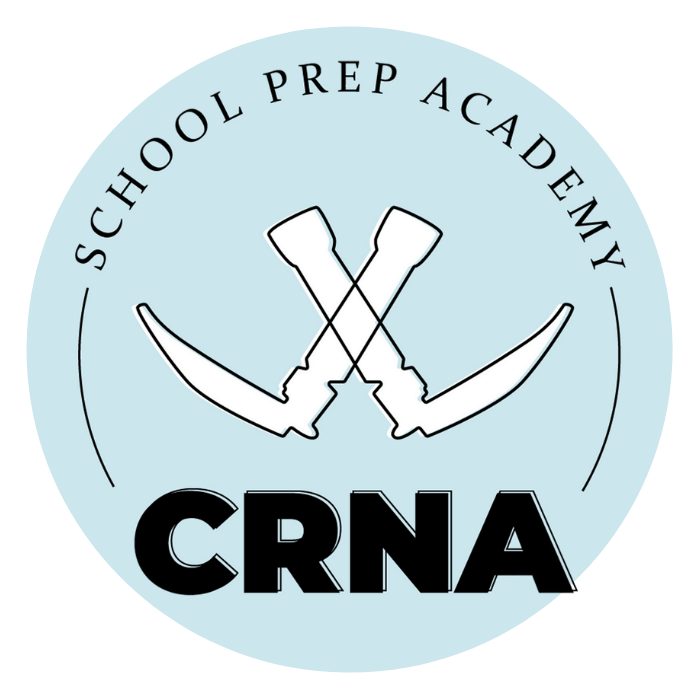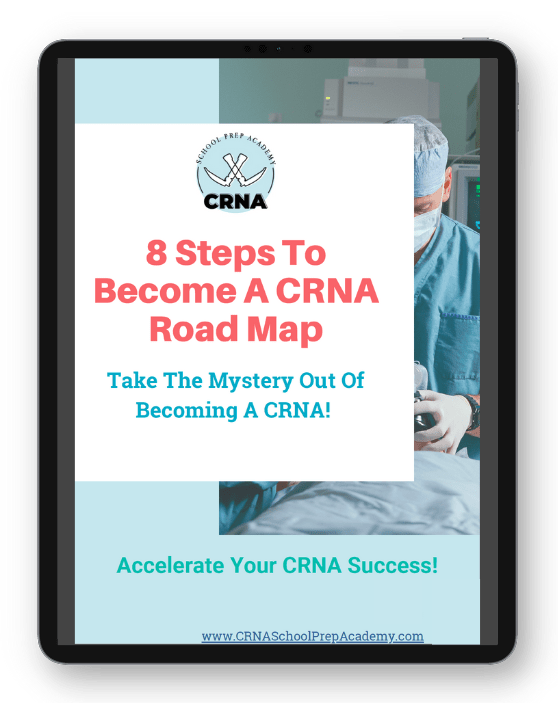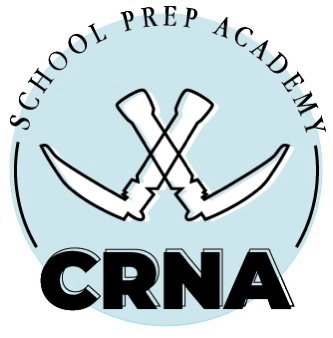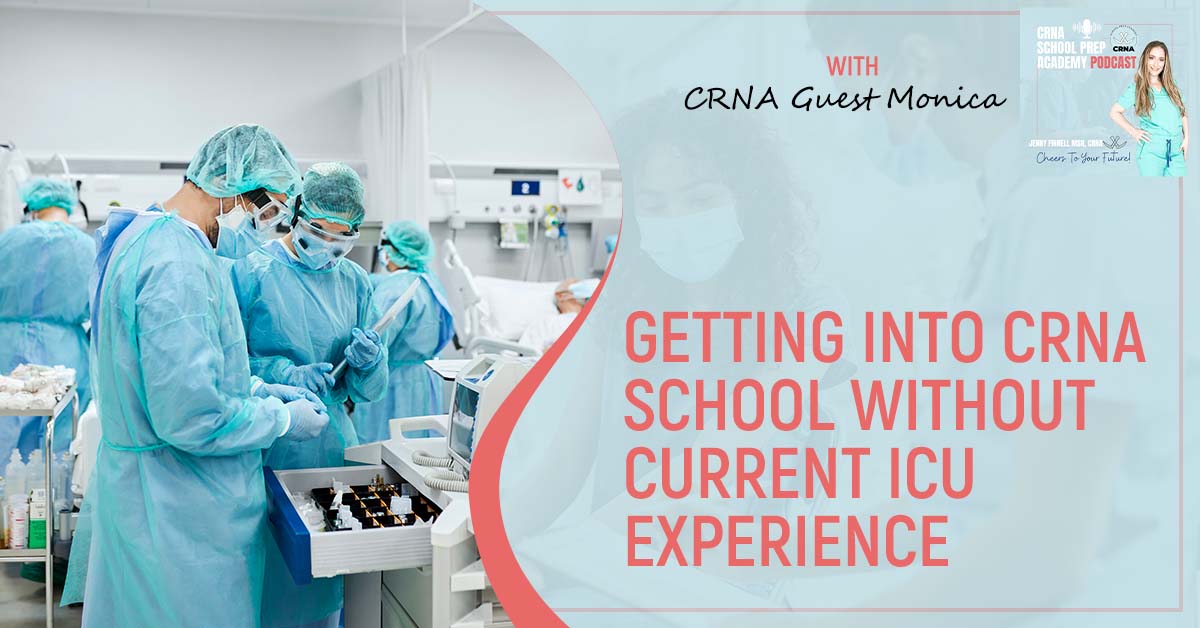
If you want to get into CRNA school but think you’re not good enough, just try. If you don’t make it, you can always try again. Nothing will ever happen if you don’t take a leap of faith. This is what Monica did. She worked in a cath lab for a while, but she knew her heart was in CRNA. So she took action and is now enrolled in CRNA school! Join Jenny Finnell as she talks to CRNA student Monica. Find out how she got into CRNA school without any current ICU experience. Learn how she took the opportunity and what she did in the interview to get in. Listen in as Jenny debunks another CRNA myth today!
Get access to planning tools, valuable CRNA Faculty guidance & mapped out courses that have been proven to accelerate your CRNA success! Become a member of CRNA School Prep Academy here:
https://www.crnaschoolprepacademy.com/join
Book a mock interview, personal statement critique, resume review and more at https://www.TeachRN.com
Join the CSPA email list: https://www.cspaedu.com/podcast-email
Send Jenny an email or make a podcast request!
Hello@CRNASchoolPrepAcademy.com
—
Watch the episode here
Listen to the podcast here
Getting Into CRNA School Without Current ICU Experience With SRNA Guest Monica
Welcome back to another episode of the show. We have a special guest episode. I’m so excited to start this series. I thought for a long time, “It’d be cool to bring more of our students on the show,” because every time I hear a success story, they always have so much gold to share with our community at large as far as what their experience was like getting accepted into CRNA school. We have our guest, Monica. Welcome, Monica.
Thank you.
I am so happy to have you. This episode’s topic is something different we’ve never done before and that is getting accepted to CRNA school without current ICU experience. It’s a cath lab experience. We’re going to share all the juice and details. First, I would love to have you share your unique nursing background and why you chose to become a CRNA.
I initially graduated from nursing school in August 2015. I went straight to the ICU. That was my goal. It was CRNA all the way. Impostor syndrome gets to you. I was like, “I don’t think I’ll ever be good enough. I’m not going to worry about it. I’m not going to apply.” I worked in the ICU for four years and left the ICU. I then went to work for a cardiology clinic and left that. I am in the cath lab. There was an opportunity. A new program has been in my hometown. It’s pretty fairly new. It is 2 to 3 years old. I was like, “I need to go for it and apply. If they don’t accept me, it’s okay. I’ll go back to the ICU, work and try again,” but they accepted me.

Congratulations. I’m so excited for you.
Thank you.
I love that you shared the fact that you suffer from impostor syndrome. This has to hit home for so many in our audience that maybe they go into the ICU with the best intentions to go back to CRNA school but they start feeling overwhelmed and scared. They’re like, “What if I get rejected?” It’s all the things. They’re like, “Am I capable? Am I smart enough? What if I do this and I hurt someone?” It’s whatever the fear may be that is keeping you from taking that leap of faith. It entered to the point where you decided to leave altogether. If you don’t mind me asking, you worked in ICU for 4 years and spent 3 years working between a cardiology office and a cath lab. Were you still thinking about CRNA that entire time?
When the opportunity comes, you just need to go for it. And if you fail, it's okay. Just try again. Click To TweetI was always thinking about it. I worked in the cardiology clinic but I worked for a cardiologist. We would always make rounds in the hospital. He does cardioversions and TEEs. I see CRNAs all the time. When we’re working in the cath lab, I still see CRNAs all the time. It was always in the back of my head. I was like, “I need to go for it.” It’s scary.
Other than having this program that was relatively new and close by, what went through your mind when you finally decided, “I’m going to give this a shot?”
It was more of if you’re still thinking about it, you need to go for it. If you fail, it’s okay. Try again.
I feel like that helps a lot with Impostor syndrome too when you think about what the worst potential outcome is and why that is so bad. That is one thing that helped me and got me off the ledge too when I suffered from Impostor syndrome. I was like, “What’s the worst thing that could happen? No? I’ll figure out how to do better next time.” It seems so simplified when you put it that way but it lets it not seem as scary when you know the outcome. The worst-case outcome is the fact that you have to try again. I love that. That’s great.
In case you didn’t pick it up earlier, Monica spent 4 years in the ICU and then 3 years outside of the ICU between the cardiology office and the cath lab. Keep that in mind for a little bit later in the show when we discuss other unique things. I want to back up before we get too far in advance. You said you always knew you want to do CRNA, even when you were in nursing school. Was there any predisposing moment? How did you find out about the career path? Was it simply because in nursing school, other nursing students were interested as well so it pushed you to learn more about it?
When I was in high school, I had to have a couple of procedures that required anesthesia. That’s where I initially knew about the profession. It was a CRNA and it ended up being a classmate of my mom who was my CRNA. She was like, “I’m so-and-so’s mom. Don’t worry. I won’t tell him that I saw you here. You’re here.” I remember her being so caring and making me feel better about what was about to happen. She explained everything that she was going to do. I then found out she was a CRNA. In high school, that was when I started looking into it. I’m like, “This is what I want to be.”
I’m curious. Did you happen to write about that in your personal statement or did the school know that?
No. I didn’t write it in my personal statement but I did talk about it in the interview.
The reason I want to highlight this to you is that a lot of people will say, “I wanted to be a CRNA ever since I can remember.” You have to understand that we don’t know where you came from. I love that aspect of it right there. How so? Otherwise, did you see it on Discovery Health? Did you hear about it from someone? Did you have an interaction that shaped your life? That’s an interaction. That’s meaningful. If you don’t have this, don’t feel bad. I sure as heck didn’t have that. I don’t even know if I knew what a CRNA was at this point.
I was in high school and I job shadowed. I was fascinated by what they were doing at the head of the bed. Although at that point, I wasn’t in tune with what a CRNA was, it gave me my first exposure to, “They put people to sleep for this. They take away their pain. This is so cool.” People want to know that aspect as far as how you got into knowing about the career path. Thank you for sharing.
CRNA School Application Stats
Let’s get into more of your application stats. I want to preface this by saying stats can be dangerous in a sense. I want you to all know to not play the comparison games. I know people are interested. Not because Monica has certain stats that you have to as well. I get it. You want to know because you want to know where you measure up. Understand that you are your own unique person and that the schools want that. Please, don’t use this as a way of saying, “I’m not good enough.” Get that mindset out of your brain before we even go into it. Let’s go ahead and share your application stats like GPA and things like that.
I went to a college and then transferred to this other college for nursing school so I can obtain my bachelor’s degree. My overall GPA was 3.3 and my nursing GPA with the specific nursing courses was 3.5.
Do you know what your last 60 credits or anything like that was?
No, I don’t know.
What about your science? Do you know what that was?
No, I don’t know. I remember the overall was 3.3. In nursing, it was 3.5.
If your overall was a 3.3, that was probably where you did some of your chemistry. I love that you pointed it out because if you look at the overall big picture, that’s probably not what I would consider a super competitive GPA for CRNA school. You worked in ICU. This is a prime example of a lot of myths that are out there that you need to be a certain thing. It’s not true. Thank you for sharing that. I know you were talking about your ICU experience but had you shadowed? Were there other leadership roles maybe that were you involved in or other volunteer activities?
I was a preceptor in the ICU. I wasn’t in any other type of leadership role though. With shadowing, I wasn’t able to shadow anyone. I did try. I wanted to shadow outside of the hospital where I worked at. It was too much for them for paperwork. I’m not sure but I never could shadow anyone so I never did shadow anyone.
I would think you working in the cath lab and with CRNAs, you were pretty well aware of the role of a CRNA from start to finish with what CRNAs did. That’s key for me in my mind. For example, if you were a MICU nurse, like me, I rarely ever ran into CRNAs. I can maybe count on one hand if I ever saw a CRNA. It wasn’t often that they ever came to the MICU. You might be exposed to other units if you’re CVICU. Take advantage of the fact that you do have connections with CRNAs because that right there is a great segue to say, “I would love to shadow you some time. Can I give you my number? Can I get your number?” Don’t be afraid. All they can say is, “No,” so ask. More than likely, they’re not going to say no.
I used to drop off patients all the time in the CVICU. You know better. If the patient’s stable and the CRNA is getting ready to leave the room and they’re charting, be cognizant of keeping an eye on them. Give them the space they need to make sure that the things are finished. For me, I’d have to run back to the OR to start another open heart case so I did not always have tons of free time.
There were some periods when if a nurse approached me and asked me that question, I’d be happy to give them my cell phone number and let them be in touch with me later. That’s a great opportunity right there. It’s the same when you’re in the cath lab exchanging digits. I’m sorry to hear about the shadowing. This is a very common experience too to outside shadowing. It’s so much easier to get a shadow experience where you work. Would you mind me asking what your hesitation was with shadowing at your hospital?
I wanted to shadow at a local level-one trauma hospital. I felt like I would see more if I shadowed over there than at the hospital I worked at here. That was it.
For those of you reading, I would love to share the fact of not being afraid to go to your own hospital. If it means not getting the experience versus getting the experience, try to always shadow at your hospital if you can get any experience. Even if you think it’s not going to be as good, I highly encourage that. With the situations we’re talking about, it has a happy ending. I know some schools are particular about the shadowing experience. If you don’t have it, even if it’s a recommended experience and not a required experience, it could not play in your favor.
Back in the day when I did it, I didn’t ask permission. People always say, “I need permission from my nurse manager.” I’m like, “No, you don’t.” I walked down to the anesthesia office and said, “I’m a nurse here. I would love to shadow a CRNA.” The chief CRNA was like, “It’s nice to meet you,” and took me under his wing. I went on from there and had several shadow experiences with CRNAs without my nurse manager ever even knowing I was there.
I did show up on my day off to do that. One time, I worked an eight-hour shift and walked down to the surgical department after my shift. The other time, I came in on my day off and asked. Don’t be afraid to do that. No one’s watching you with binoculars. At the end of the day, it’s still worth trying to get the experience if you can. Thank you for letting me go on about that. What about any volunteer experience? Did you have any volunteer experience outside of the hospital even?
I did not.
That’s okay. I’m just asking. I’m simply letting the audience know. Even back when I applied, at the time, I wasn’t mentoring other people. I didn’t know any better myself. I didn’t even precept. I never charged. I did some committee work but I didn’t have any recent volunteer experience either. They didn’t hinder me either. I volunteered back in college and then in high school. They were minimal volunteer experience with the soup kitchen. I was a candy striper. I volunteered at the hospital every summer throughout high school. I didn’t have any recent volunteer experience.
A lot of people get so worried about having the right volunteer experience or enough. I want to paint a picture that even if you don’t have anything, that’s okay. Don’t kill yourself trying to get 100 volunteer hours for CRNA school. At the end of the day, it may not matter. They just like to know that you’ve done other things outside of your role as a nurse for the most part. That’s what most schools will say. They want to see if you’re well-rounded. We talked about the shadow experience and it was hard for you to get the out-of-hospital shadow experience. Did you have any issues with your references? Whom did you have to ask for those?
The school required an old faculty member, a supervisor and another person. It could be anyone. I ended up asking my old charge nurse in the ICU, my old ICU supervisor and a nursing instructor that I had back in nursing school.
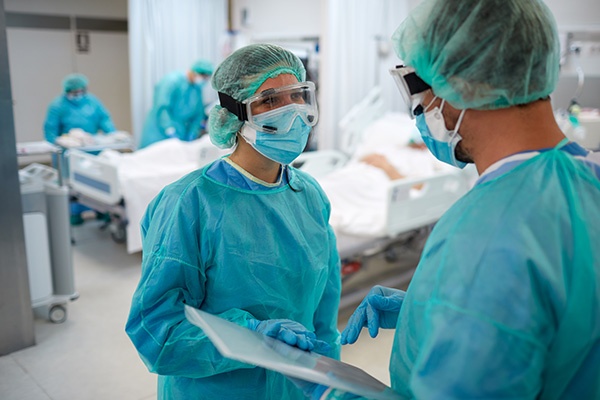
I love the fact that you were able to even ask your old ICU charge and ICU nurse supervisor because that had been three years. The school didn’t have a problem with it and the fact that it wasn’t current because they stated that your ICU experience had to be within that three-year mark. Pay attention to your applications. If you’re not current ICU, pay attention to how long you have that you could be out of the ICU. Monica specifically said they said three years was the maximum and she had hit exactly that maximum. Most schools will expect a current ICU nurse manager because they also equally expect current ICU experience, which can be a problem.
Even if you’re traveling, it might be ICU but it’s hard to ask an ICU nurse on a travel assignment for a reference when they barely know you. A lot of ways to get around this is to stay contingent at your long-standing ICU position so you technically still have a current ICU nurse manager who knows you well for those.
Networking In The CRNA Community
Faculty is a common one that a lot of people, when they’re in nursing school, don’t think, “I want to make sure I get someone who’s going to be my future reference for grad school.” At least it wasn’t on my radar in nursing school. I had looked at the requirements but I don’t remember the faculty piece sticking in my brain for some odd reason until right after I graduated.
I started diving into the requirements as soon as I graduated from nursing school. At that moment, I’m like, “I need a faculty.” I luckily had someone whom I confided in about going to CRNA school. I had been working toward this goal even as a nursing student. It was my senior year. She was the ICU nurse coordinator and educator. I confided in her and she helped me land an SICU and an ICU rotation in nursing school because of that. It was no surprise when I reached out for a reference letter. With your instructor, how long had you been out of school since the time you reached out?
It was seven years. I was friends with her on Facebook so we were able to catch up with each other through Facebook. All I did was message her and ask her. She was like, “I will.” Don’t be afraid to ask because I was afraid. I was like, “It has been so long. Do you remember me?” She did remember me so she said, “I will do that for you.”
It's good to stay in touch with your past instructors just in case you need them as references for your CRNA application. Click To TweetFor those of you who are reading this early on in the process, keep that in mind. Look into that early on if you can. Pick out someone that you like, if you have an instructor and stay close to them. Did you attend any open houses or our CSPA conference or anything like that?
I did attend your conference. It was very helpful, for sure. They did have not an open house. It was more of a Zoom meeting. I feel like they didn’t broadcast it that much. It wasn’t until I decided I wanted to go to this particular school that I emailed the school and they were like, “We’re having a Zoom event if you want to attend. We’ll be able to answer more questions.” That’s what I did. They answered all of our questions. It was a Zoom meeting so you saw other people that were interested as well.
I love the fact that you emailed. You’re right. It’s a marketing piece. Trust me. The schools wish they could let you know about these events but it takes a lot of effort to market events and things like that. A lot of these schools are pretty limited. It’s not like the faculty is out there. They’re doing what they can if they have a Facebook page or an Instagram. With the competitive nature of the social media space, whether you know they have an event, it is probably more up to you to look and seek it out versus expecting it to pop up on your Facebook page or Instagram feed or land in your inbox.
If you’re wanting to go to CRNA school, make sure you’re doing your due diligence and try to find out when the next open house event is. All programs have one. It’s just a matter of when it is. They’re not necessarily going to probably market it heavily so you have to seek it out. Thank you. I like the fact that you attended our conference. I’m not going to disclose the school and I never will on this show. FYI for you guys, I have to keep that private.
Any conference that’s anesthesia-related, whether that’s a state association conference or our conference that we host every year, it’s a great opportunity to not only connect with fellow applicants who equally have a lot of questions and are trying to figure out their path, you learn from them too as you do on this show; you can connect with other faculty as well.
Our community’s small and they all communicate. Asking your questions to one faculty member can give you a good insight into what your program would equally find valuable. It’s great that you did that and immersed yourself in that type of environment to get your questions answered. That’s great. Thank you. This is my next question. Feel free to share whatever you wish. You talked about Impostor syndrome but was there anything in particular that scared you the most about applying to CRNA school or that you feared that you weren’t going to be good enough because?
I wouldn’t say fear but it’s that I would have to end up going back to the ICU. I waited seven years to apply. If I had to go back, I’ll go back for another year of experience and apply again. That was it.
It sounds like the ICU experience left you saying, “I never want to return,” which is understandable.
I enjoyed working there. I feel like the people that I worked with made it more enjoyable. Not only that but going back and being like, “I’ve got to start all over again.” That’s what I feel like.
Any new position period is stressful. I also love the fact that you said that that was what you knew you were going to have to do if you were unsuccessful but you were going to give it a shot. I’ve had someone reach out to me who has NICU experience. She knows it’s not the preferred unit of choice for her program but they do accept NICU. That is the Neonatal ICU. For those of you reading, that’s what I’m referencing.
She’s going to give it a shot. She’s in the same situation as you. She understands that to put her best foot forward, she might have to move back to an adult ICU but she doesn’t want to. She wants to give it a shot with what she has. There’s nothing wrong with that. Don’t be afraid to apply and see what happens. The worst-case scenario is that you will have to do what you probably already know you need to do to get into that program the next year. Thank you for sharing that.
CRNA School Interview Prep
This is the next question. You’re a part of CSPA. Were there CSPA resources that you found to be the most beneficial when preparing for both your application and interview?
Yes, the mock interview library and the learning library. I like that the most, especially getting a mock interview or having one done, that was very helpful.
Getting a mock interview done before your real interview is very helpful. Click To TweetYou did one mock, correct?
Yes, I did one.
With the vast majority of students that we hear sharing their success stories, they have a lot of recurring things, which is why I ask this question. I like to know what it is that our students find the most valuable. For me, that’s a big indicator that these are the big predictors of success. The interview is what gets you accepted. We’ve known for a long time that the application gets you the interview but the interview gets you accepted.
I can’t stress enough the importance of prepping for the interview. A lot of that starts with brushing up on your ICU education and that is what the learning library is. We renamed it the Critical Care Learning library because I wanted people to know exactly what it was. It’s multifaceted. The information we share in the learning library is critical care knowledge but it also so happens to be part of your curriculum in anesthesia school. That means it’s going to serve you in both ways. Not only is it going to help you prepare for the interview but it’s also going to help give you a boost when you start your programs as well.
I love the fact that you love that. It’s pathophysiology, pharmacology and all that fun stuff. There are also mock interviews. Correct me if you have more insights into this. Watching other people do either a group mock interview or a one-on-one mock interview allows you to almost have a practice run for yourself without doing it. It allows you to see what they did well, what you liked and what you didn’t like. It gives you some insight as to, “I like the way they said that.” Am I correct in that?
You’re right. It’s seeing the way that they answered the questions and then I would try to answer them too with them. I’m like, “I would say this.” By listening to them, I’d be like, “I was right.” It did help a lot looking at their body language and seeing them. I’m like, “I like the way that they answered this.”
I love how you mentioned body language. That’s the silent killer. People don’t know. People are completely unaware most of the time, especially when they’re nervous and on high alert, of what their body’s doing on the outside. You’re so focused on keeping your composure on the inside that sometimes, you can lose reality with what you’re doing. People start clicking their pens, playing with their hair, darting in their eyeballs all across the room or not smiling.
If you talk with a smile, you tend to sound happy. If you talk without a smile, you tend to sound less happy and more monotone. You’re not as warm and friendly. You have to be aware of that because you want to come across as friendly. I’m not saying you’re not friendly but it’s the inference people make when they hear a monotone speaker because they’re not talking with a smile. Thank you for sharing that. With all that being said, it sounds like you put a lot into your interview prep. With the one-on-one mock interviews, I also equally hear so many people say they’ve done a one-on-one mock interview or more and ended up being successful. How did you feel your interview went?
Honestly, I felt pretty confident. I’m not going to lie. I felt like the mock interview that I had helped. I felt like with the mock interview, I was so stiff. He told me, “You need to show your personality.” I felt like I was more nervous about the mock interview than I was about the real interview.
That’s because you got it out of the way. It helped you to have that first experience. That’s great.
I felt confident but then, I would think about some questions and be like, “I should have said this.” I would replay it in my head and be like, “I should have said this or that.” It was over. Ultimately, it was out of my hands at that point. I was like, “I did the best that I could and went for it.”
You overall felt very confident. It doesn’t mean your interview went perfectly. We spoke in private that you did still miss some questions. I would love to share at least the one question that stood out to you the most that you missed. How did you handle that as far as following up with the school?
That question, I wasn’t prepared for it. It was about a medication that we use mainly in the cath lab. I was expecting some other type of medication so I studied a lot about that. This particular medication that they asked me about was more of a deficiency or something like that. I wasn’t sure. I was like, “I’m sorry. I don’t know.” They were like, “It’s okay. We’ll go on to the next question.” After the interview, I looked it up and emailed them back. I was thanking them for interviewing me and also letting them know. I was like, “I looked up the question that you asked me about. This is what I found out.” I let them know what I found out and know now.

You took initiative to try to find the answer that you didn’t know. That shows your willingness that even if you don’t know something, you’re going to learn it. That’s all anyone or any educator can ask for. Even as faculty, they know that when you’re coming to the interview, you’re not going to get everything right but then how did you handle yourself when you didn’t know it? The follow-up experience too is powerful. I wanted to highlight that and point it out.
We’re not going to disclose the actual questions. I know you’re probably like, “I got to know this medication.” I equally want to state that this particular medication can be used in the ICU. We routinely and equally use it in the medical ICU sometimes too. It’s not super exclusive to the cath lab. For the most part, know that we talk about it. If I don’t, I’m going to make sure I add it to our pharmacology lessons inside the academy. Be rest assured.
The follow-through can be important. I had another student do something similar where he didn’t know the answer to the question and followed through and followed up with the faculty. They were so excited to hear from this person that they said, “We appreciate your thorough follow-through. It shows that you take initiative.” I don’t think all students are doing this. That’s a little hint to make sure that you’re doing that.
You don’t have to hit every question. Don’t get me wrong. Don’t send these schools a laundry list of all the questions you got wrong. Pick at least a few that you felt like you could improve upon the most and hit there versus trying to say, “I could’ve answered this differently. Let me re-tell you about myself.” Don’t do that. Keep it brief and concise. They’re not going to read a two-page essay after your interview. If you keep it to a paragraph and thank them, it makes the thank you follow-up a little bit more thorough.
I equally love the fact that you felt confident about this interview. If you guys are wondering, she’s speaking out to Jordan. I’d love to shout out our mock interview provider. That was Jordan Truby that did Monica’s mock interview. Here is a shout-out to Jordan. Thank you. If you’re looking for a mock interview, they’re housed through the TeachRN platform. We built this on purpose because we want to be able to serve you better and serve more of you in this area that we know is so valuable. There are a lot of people who offer mock interviews there. They’re all SRNAs or CRNAs. Jordan’s an SRNA. He’s still in school. He’s been around with us for years. He does a fabulous job. Let’s move on. When did you find out you were accepted?
It was probably about a week after my interview.
That’s not too bad. That’s not too much torture. Did you find out via email? Did you get a letter? Is it both?
They emailed me the letter.
Back in the day, I had to wait for a letter. It wasn’t even that long ago. I remember it came in an envelope and I was so nervous to open it.
Whenever I saw the email, I thought I would be getting it from the director but it was from their facilitator. Whenever I saw her name, I was like, “I didn’t get in.” I clicked on the little PDF and then it was like, “Congratulations.” I was so excited.
You’ll never forget that moment. That’s awesome. I equally suggest that you take that, print it and frame it. I did that. I was so proud of that letter that when I had a day where I wasn’t feeling good or getting beat down or whatever it was during school, I would look at that letter and be like, “I earned this. I’m here and I’m doing it. I can do this. They picked me for a reason.” Everyone should frame their acceptance letter. Congratulations.
That wait kills a lot of people but I equally want to point out that you could get it via email or letter. Make sure you’re looking for the email and checking your spam. You’re probably like, “I can’t check my inbox enough.” It’s not maybe for the acceptance piece of it but for the interview piece of it. I’ve had students miss the request to interview. It’s because it’s either coming via phone call or email and they don’t recognize the phone number so it goes to their voicemail or email. It’s the same thing. They miss it. Be hypervigilant about checking your inbox for these emails and stuff like that because that would be sad.

How did you follow through with these programs then? We get a lot of questions like, “How should I thank? Whom should I thank?” I equally forgot to ask you when you sent that follow-through letter about the thank you for the interview. Did you email the program director or the entire interview panel that interviewed you?
I wasn’t sure how to approach it but I emailed the director with the answer to my question that I found out because she’s the one that asked me that question. I also individually emailed the other faculty members that were in my interview.
I like the individual ones. Not everyone’s going to know who is in their interview panel or has all their emails. Always email the program director, for sure but if you know the rest of them, especially if you remember a specific question they asked, that would be a nice personal touch to the email. How did you reach out to thank them after the acceptance letter? Did you?
I did. I emailed them all again. I emailed the director thanking her and telling her I’m so excited to start the program.
Once you get an acceptance letter, thank them and say that you're excited to start with the program. Click To Tweet
Believe In Yourself
This is a question to summarize or sum everything up. If you could go back in time and do anything different, what would that be, if anything?
I would’ve gone for it. I wouldn’t have waited so long. I should have done it. You need to believe in yourself. I feel like that’s the most important part because that’s what’s going to get you through the application process and school.
I’ve noticed a recurring theme in what I do with CSPA. It’s about getting our audience to do that, to take that leap of faith and take action. Nothing’s ever going to happen if you’re not willing to put yourself out there. You’ll never succeed or fail if you don’t try. Trying may result in failure but trying can also result in success. Until you take that chance on yourself, you’re never going to know what’s going to happen or what the outcome’s going to be. Equally, if you don’t take that chance, you will never know how to improvise and re-strategize and do something different so you do find success. I love that.
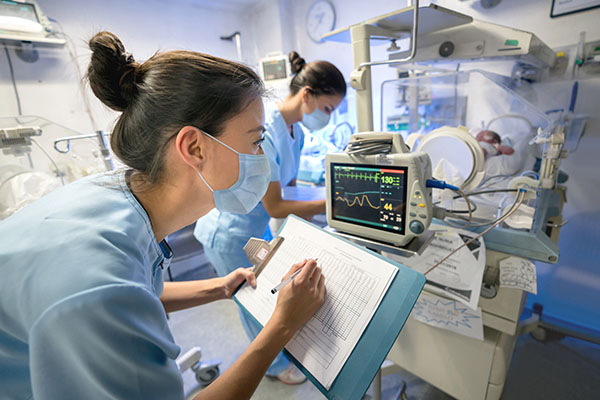
We all probably have something in our lives that we’re like, “Why didn’t I do it? Why didn’t I come back?” This will reach some of those who are in those same shoes as you who are like, “I’m fearful. I don’t know if I can do this. I’m not smart enough.” I was scared of not being smart enough, being too dumb and making a fool of myself. I was equally scared of the responsibility. I was like, “Am I going to be good enough to be a CRNA?” With all that being said, you’re passing this unnecessary judgment on yourself for no reason because you had this mental block about who you were as a person.
If you take away anything from this episode, I hope that you take away the fact that this journey starts from within. This journey starts with you having a belief in yourself. That can be supported and fostered through a community within CRNA School Prep Academy and through fellow nurses who were on the same path.
I didn’t have something like CSPA but I had girlfriends of mine whom all wanted this as badly as I did. We were each other’s cheerleaders. We studied, interviewed and got in together. It was amazing. Had I not had that, I don’t know. A huge push for me was to see my friends whom I equally respected and loved go for it as well. I’m like, “If you’re going to go for it, I’m going to go for it. If you’re going to jump, I’m going to jump. We’re all going to land somehow. We’ll see who makes it out.” Thank you for coming to the show. I appreciate having you here.
Thank you so much for having me.
Important Links
Get access to planning tools, mock interviews, valuable CRNA Faculty guidance, and mapped-out courses that have been proven to accelerate your CRNA success! Become a member of CRNA School Prep Academy: https://www.crnaschoolprepacademy.com/join
Book a mock interview, personal statement critique, resume review and more at https://www.TeachRN.com
Join the CSPA email list: https://www.cspaedu.com/podcast-email
Send Jenny an email or make a podcast request!
